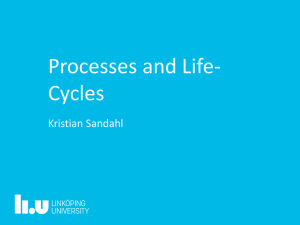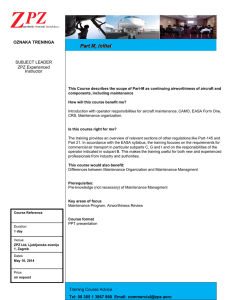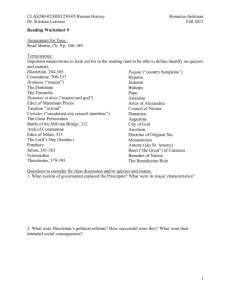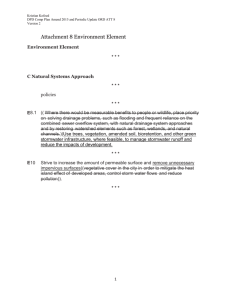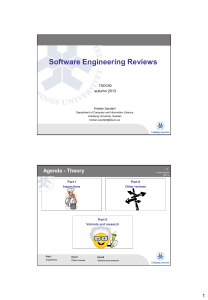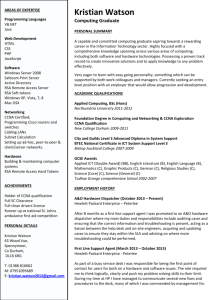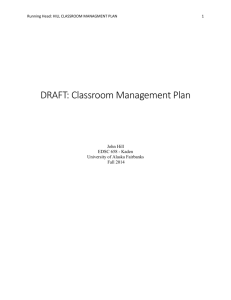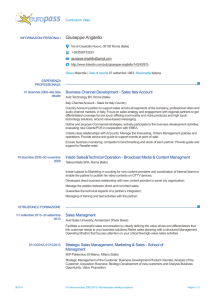Project Management Kristian Sandahl
advertisement
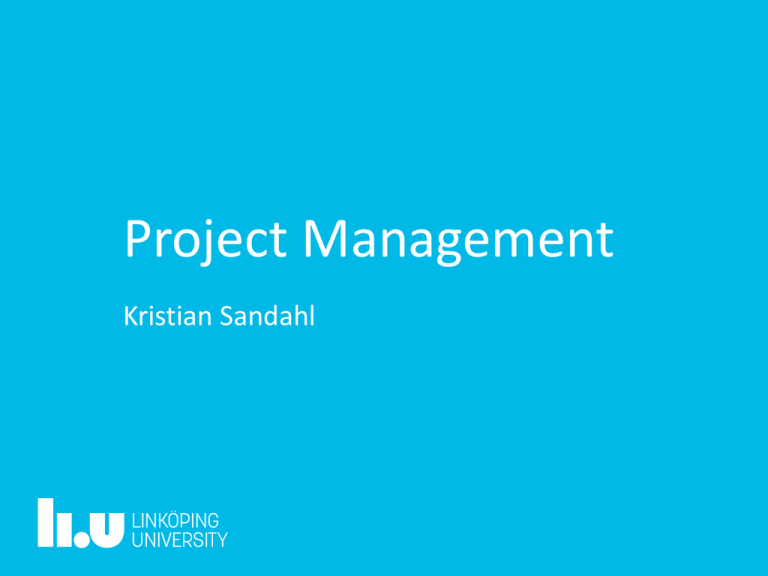
Project Management Kristian Sandahl Maintenance Validate Requirements, Verify Specification Acceptance Test Requirements (Release testing) Verify System Design System Design System Testing (Architecture, High-level Design) (Integration testing of modules) Module Design (Program Design, Detailed Design) Verify Module Design Module Testing (Integration testing of units) Verify Implementation Implementation of Units (classes, procedures, functions) Unit testing Project Management, Software Quality Assurance (SQA), Supporting Tools, Education 2 Project Managment/Kristian Sandahl What is a project? SEPTEMBER 15, 2015 3 Project Managment/Kristian Sandahl SEPTEMBER 15, 2015 Definition of a project • A project is a temporary endeavor undertaken to create a unique product or service Project Management Institute 4 Project Managment/Kristian Sandahl Necessary parts of a project SEPTEMBER 15, 2015 5 Project Managment/Kristian Sandahl SEPTEMBER 15, 2015 There is always a balance between goal and process Clear purpose/goal, but no predefined process to follow to get there. Unclear purpose/goal, but a strict process that you have to follow. 6 SEPTEMBER 15, 2015 Project Managment/Kristian Sandahl 7 Smart goals • Specific Must be straightforward and answer the questions: What will you do? Why is it important? • Measurable If you cannot measure it, how do you then know if the goal is reached or not? • Agreed upon Agreed upon with all stakeholders (e.g. customer, user etc.) • Realistic Possible with the current resources, knowledge and time. You must be both willing and able to do it. • Timely A clear time frame for the goal. Project Managment/Kristian Sandahl SEPTEMBER 15, 2015 A SMART goal is normally the best, but … • 18 years late • 11 times more costly • Injured employees • Dead cows 8 SEPTEMBER 15, 2015 Project Managment/Kristian Sandahl A stakeholder has a major interest in the project outcome Customer - Pays for the system Development Organization Provides the system User - Uses the system Stakeholders A person or an organization Supplier 9 SEPTEMBER 15, 2015 Project Managment/Kristian Sandahl 10 The four dependent project parameters Calendar Time Resources Project Features Quality SEPTEMBER 15, 2015 Project Managment/Kristian Sandahl 11 Tasks, duration, and dependencies Phases Gantt-chart Phase Task A Task/Activity Duration Dependency Task B Task A is predecessor (precursor) of Task B SEPTEMBER 15, 2015 Project Managment/Kristian Sandahl 12 Critical path, slack time, and real time Critical Path Slack (float) time Available time = Slack time + Real time Real time (estimated) SEPTEMBER 15, 2015 Project Managment/Kristian Sandahl 13 Mile-stone and toll-gate Milestone Verify internal sub-goal fulfillment Properties of a SMART goal Tollgate External decision point E.g. after a pre-study phase, the customer decides if the project should continue or not. SEPTEMBER 15, 2015 Project Managment/Kristian Sandahl 14 Effort estimation in practice? No idea. I have never done this before... I wonder if it is even possible. How long time does it take for you to implement the encryption layer? 8 months +- 2 months Sam the seller Harry the hacker Project Managment/Kristian Sandahl SEPTEMBER 15, 2015 Two lines of research and practice 15 Project Managment/Kristian Sandahl SEPTEMBER 15, 2015 Agile estimation and planning poker • Variant of Delphi method • Unit: Hours or Points (the effort of a well understood, small item) • Fibonacci-series of numbers 16 SEPTEMBER 15, 2015 Project Managment/Kristian Sandahl Buffer time is a key to success Buffer Time External Deadline Internal Deadline Time Buffer To whom should you communicate the deadlines? 17 Project Managment/Kristian Sandahl SEPTEMBER 15, 2015 A good team is another key to success Team efficiency A good team can produce better results than individuals working alone. 18 Project Managment/Kristian Sandahl Optimal team size Optimal size between 5-12 members Large projects can divide into several teams. SEPTEMBER 15, 2015 19 Project Managment/Kristian Sandahl SEPTEMBER 15, 2015 Risk is something that can eliminate full success of the project Staff turnover Experienced team members will leave the project Requirement change - Significant requirements will change late in the process. Size underestimated - The size of the project was larger then expected 20 Project Managment/Kristian Sandahl SEPTEMBER 15, 2015 Kinds of risks General Project Specific "A team member gets sick" "The delivery of the development hardware environment is delayed." "There is a risk that the project gets delayed" Direct The project has great control "The Windows platform will not scale" "Anders needs to visit his family, since his father is sick." Indirect Risk where the project has little control "The servers will stop running due to an earthquake" 21 SEPTEMBER 15, 2015 Project Managment/Kristian Sandahl 22 Risk management is the process of measuring or assessing risk and then developing strategies to manage the risk. Iterate Risk identification Risk analysis Risk planning Risk monitoring List of potential risks Prioritized list Risk plan Risk assessment "What can go wrong" "How bad is it" "What shall we do with it" "Has the probability changed?" Project Managment/Kristian Sandahl SEPTEMBER 15, 2015 1. Risk identification: brainstorming • What can go wrong? Technology risks Hardware/software technology used for development, e.g. using Java People risks - people in the development team Organizational risks Tools risks - Risks with the current tool used Requirements risks - Changes in customer requirements Estimation risks - Wrong project estimations 23 SEPTEMBER 15, 2015 Project Managment/Kristian Sandahl 24 2. Risk analysis catastrophic 4 Impact Probability low 1 moderate 2 Probability x Impact = high 3 very high 4 Risk Magnitude Indicator serious 3 tolerable 2 insignificant 1 Sort list after risk magnitude! SEPTEMBER 15, 2015 Project Managment/Kristian Sandahl 25 3. Risk planning: What do we do if…? 1. Risk Avoidance Reorganize so that the risk disappears. 2. Risk Transfer Reorganize so that someone else takes the risk, insurance, customer, bank. 3. Risk Acceptance Live with it "Communication problem between develop sites in Stockholm and India -> localize all development in India?" "the web-server fails often low accessibility -> outsource the operation?" "Changes of requirements late in project -> a prototype?" Mitigate the risk Lower the probability. "The key architect starts to work for another company -> 2 architects?" Define Contingency plan Lower the impact A plan B... SEPTEMBER 15, 2015 Project Managment/Kristian Sandahl Identify Example No Risk Description 1 During implementation it is discovered that the new web-platform cannot talk to the legacy database system 26 Analyze Probability Moderate (2) Impact Risk Factor Serious (3) 6 Plan Avoid risk: Do not introduce a new web-platform. Use the existing platform. Transfer risk: Sign a contract with a contractor, who guarantees access to the system. Accept risk Mitigate: - Create a prototype early in the process. - Solve issues before implementation phase Contingency plan: Transfer the whole old legacy database system to a modern DBMS. SEPTEMBER 15, 2015 Project Managment/Kristian Sandahl Make risks useful Few (3-10) Project Specific Regular meetings 27 Project Managment/Kristian Sandahl SEPTEMBER 15, 2015 The project plan Tool for the project manager Communication medium between project members and other stakeholders What should be done, when and by who When is the plan finished? 28 SEPTEMBER 15, 2015 Project Managment/Kristian Sandahl Content of the project plan Project Description Background to the project Relevant constraints (budget etc.) Project Goal Start and expected end date. Project Organization Roles Knowledge / skill Training Communication and reports Time and Resource Plan Milestones Tollgates Deliverables Activities Resources Risk Management Risks, Probability, and Impact Mitigation and Contingency plan 29 Project Managment/Kristian Sandahl SEPTEMBER 15, 2015 Project status reports Summary - current status What has happened since last report What happens next (both in long and short term) Problems and risks 30 www.liu.se

